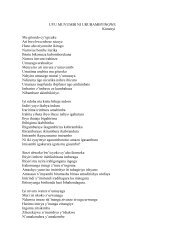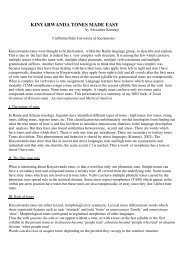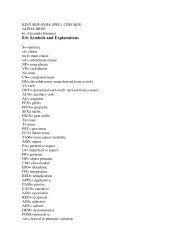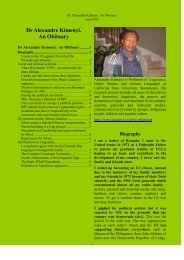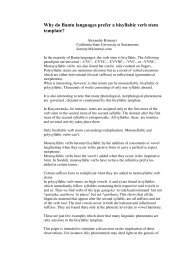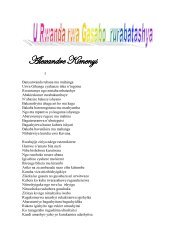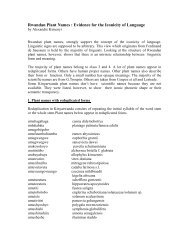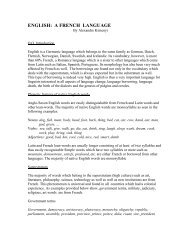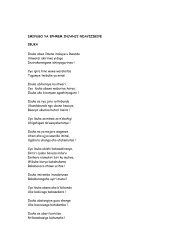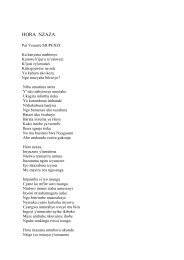The Batwa Language - Alexandre Kimenyi
The Batwa Language - Alexandre Kimenyi
The Batwa Language - Alexandre Kimenyi
- No tags were found...
You also want an ePaper? Increase the reach of your titles
YUMPU automatically turns print PDFs into web optimized ePapers that Google loves.
<strong>The</strong> <strong>Batwa</strong> <strong>Language</strong>: Studies in Cultural Survival, <strong>Language</strong>Preservation and Ethnic Identity.<strong>Alexandre</strong> <strong>Kimenyi</strong>1. Description:<strong>The</strong> purpose of this project is two-fold: to write an entire grammar of the <strong>Batwa</strong>language of Rwanda and to record their oral literature for further study after thecompletion of the description of their language. <strong>The</strong> <strong>Batwa</strong> are one of the three socialgroups which make up the Rwandan society. <strong>The</strong> other two are Batutsi and Bahutu. <strong>The</strong><strong>Batwa</strong> belong to the lowest stratum of the society. <strong>The</strong>y are recognizable by anybodywho speaks Kinyarwanda because they have a distinct accent as far as tones andintonation are concerned. This study will describe all aspects of their speech: the soundsystem (phonology), word creation and structure (morphology), the sentence patternsand processes (syntax) and meanings (semantics). This analysis will be contrasted withStandard Kinyarwanda to see how the <strong>Batwa</strong> dialect differs from it. In phonology, thetask will be to find out if both dialects have the same phonemic inventory, whether the<strong>Batwa</strong> dialect has less or more sounds than the standard dialect or if it uses phoneticvariations. At the suprasegmental level, it will be examined if the <strong>Batwa</strong> dialect has thesame tone rules like the Standard dialect namely Tone Rhythm Rules: Beat Movement,Beat Addition, Beat Deletion, Beat Alternation, etc (<strong>Kimenyi</strong>, 1993), toneanticipation, tone variation, etc. In morphology, we will see if the <strong>Batwa</strong> dialect has thesame number of noun classes and if these class prefixes have the same function in bothdialects. <strong>The</strong> standard dialect uses these class prefixes also to create new lexical itemswhose meanings are metonymically associated with the ones of the primary plane ofexpression. We will thus be able to find out if the <strong>Batwa</strong> dialect is as productive as far asprefix or zero-derivation is concerned. <strong>The</strong> language of poetry (<strong>Kimenyi</strong>, 1988) uses thisdevice a lot . As far as verb morphology is concerned we will look at the tense-spectmodalitysystem and grammatical suffixes. Are these morphemes which indicate tenses,the perfective and the imperfective aspects and moods, used the same way? Does the<strong>Batwa</strong> dialect also use grammatical suffixes such as benefactives, causatives,reciprocals, etc. If it does, do they have a similar function? Is the same word orderrespected in case of multiple grammatical suffixes?In semantics, are there any faux amis (false cognates), similar words but with differentmeanings? Are there any words which are only found in the <strong>Batwa</strong> dialect? Are thereany words which exist in the standard language but are not found in this dialect?Kinyarwanda has different types of specialized "languages": the language of poetry(panegyric, dynastic and pastoral), the hunting language, the language of initiation , thelanguage of blacksmiths, etc. Most of these specialized languages differ from thestandard language only in vocabulary. This vocabulary is either archaic, borrowed fromneighboring languages or found in the standard language but with different meanings.<strong>The</strong> cult language uses the same strategies but it also uses prefix derivation and sound
substitution, syllable addition or truncation. How does the <strong>Batwa</strong> language differ fromall these types of languages?In the standard dialect, women use a taboo language (<strong>Kimenyi</strong> 1989&1993). Not onlyare they not allowed to utter their parents-in-law's names but they also have to find orcreate new lexical items for all words which sound like their names. Do the <strong>Batwa</strong>women use this taboo language as well? How about the polite language used by wives torefer to their husbands and the intimate language used by women among themselves?<strong>The</strong>re are certain expressions which are used by women only which refer to the addressee.Do <strong>Batwa</strong> women use them as well? Do they use different ones? <strong>The</strong>se are some of theissues that this study will investigate.2. Methodology:<strong>The</strong>re will be two types of data: Taped natural conversation from as many people aspossible and data from oral literature: folktales, riddles, proverbs, panegyric poetryand children literature: jumping rope rimes, nursery rimes and tongue twisters. Ethnicjokes, if there are any, about the other two groups namely the Bahutu and the Batutsior jokes about <strong>Batwa</strong> by themselves will also be collected. Kinyarwanda has a lot ofjokes about <strong>Batwa</strong> which ridicule them as being naive and stupid. Oral literature will beused because all these genres use some formulaic expressions in the beginning or in theend or in the introduction of certain motifs and characters. <strong>The</strong>se formulaic expressionsare rigid, don't allow changes in vocabulary and in the structure and sometimes usearchaic language. It should then be expected to find typical <strong>Batwa</strong> words in these genresof oral literature.I am mostly interested in myth folktales, the ones which explain natural phenemonasuch as the world creation, the genesis of natural phenomana, the explanation of socialinequalities, the origin of death. It is expected that they might have their own version ofwhy <strong>Batwa</strong> are who they are. We don't even know if they like their condition or if theyenvy people who belong to the other groups. Since this is an oral tradition societywithout historical written records, these myth folktales are the only ones which haveanswers and explanations to the questions that are being raised and which can help us tounderstand the <strong>Batwa</strong> philosophy, their concepts, how they see the world, their valuesand and their customs.3. Importance of the projectLike the Brakumin of Japan, the Untouchables of India and the Gypsies of Europe, the<strong>Batwa</strong> of central Africa (Zaïre, Rwanda, Burundi, Uganda) are also the pariahs in thesecountries. <strong>The</strong>y are considered as subhumans without human and civil rights. Like inother stratified societies, the <strong>Batwa</strong> are the entertainers: clowns, singers, dancers.<strong>The</strong>y are despised and eat the food which is considered dirty and inedible by the societysuch as lamb, dead animals. <strong>The</strong>y are the only ones who smoke marijuana, they arebeggars and they were the executioners. <strong>The</strong>re are a lot of <strong>Batwa</strong> jokes which make funof them as being dumb and naive. To justify their mistreatment and their lower socialstatus, the society has a lot of folktales which offer an explanation. <strong>The</strong>ir second citizenor sub-human status is seen as punishment from either Imana (God) or from the mythicalfather of the Rwandan nation, Gihanga. Gatwa from whom all <strong>Batwa</strong> descended, these
stories state, acted more irresponsibly than his two brothers Gahutu and Gatutsi and wasalways unable to accomplish the duties assigned to him by his father. Gihanga cursedhim, refused him inheritance and told him that in order to survive he had to beg foodfrom his two siblings.<strong>The</strong> <strong>Batwa</strong> population is under 1%. <strong>The</strong> number has decreased first because they werewarriors and had high casualties on the battlefields and also because their women weretaken from them by the Bahutu and the Batutsi who could not come up with bridewealth.<strong>The</strong> offsprings became automatically either Bahutu or Batutsi because in this patriarchalsystem the child takes the social group of the father. <strong>The</strong> male <strong>Batwa</strong> could not findspouses since they are not allowed to marry in the other groups. <strong>The</strong> <strong>Batwa</strong> who alsodistinguished themselves in the war or other skills were made Batutsi by the King ofRwanda. All these factors reduced the number of <strong>Batwa</strong> not only in Rwanda but inneighboring countries as well.Despite the fact that these people who in Rwanda are less than 1% of the population andhave no homeland of their own, they have a distinct culture which is noticeable mostly inthe way they dance and the way they sing. <strong>The</strong>y also have a very noticeable accent.While their contribution to the music has been reported and recorded, nothing has beenwritten about their language.<strong>The</strong> <strong>Batwa</strong> are related to the pygmies but there are many Bahutu and Batutsi who madethemselves <strong>Batwa</strong> also for socio-economical reasons because the <strong>Batwa</strong> are the onlypeople who are allowed to beg without feeling shame and humiliation in this society.<strong>The</strong> project is important not only for linguists but also for anthropologists, historians,sociologists and all scholars who are interested in language maintanance, culturalsurvival and ethnogenesis, the attempt by minority groups to have a distinct cultural andlinguistic identity.<strong>The</strong> only minority dialect that has received linguistic attention is Black English. <strong>The</strong>re isno other serious study of "ethnic" dialect that is available. Only regional dialects studiesare found. This study will hopefully stimulate interest among linguists in studyingminority dialects and offer a methology as how to go about it.This study will shed light also as to whether we are dealing with language maintainanceor ethnognesis or both. <strong>The</strong> research will probably show that both phenomena aretaking place at the same time. First, most of the <strong>Batwa</strong> are bidialectal because they canswitch very easily to the standard dialect, which indicates that there is a serious effort bythis group to be different and have a distinct ethnic identity. Although <strong>Batwa</strong> are secondclass citizens there is a certain advantage of speaking the <strong>Batwa</strong> way. Eventhough theydon't own anything, the <strong>Batwa</strong> are the only group which has freedom of speech. <strong>The</strong>ycan use dirty language, they can insult anybody even important personalities andcriticize the government without any fear of repercution. Secondly they can beg foranything they want without shame or humiliation. Third, since in the traditionalRwandan society people are supposed to share food, the <strong>Batwa</strong> are always sure to havethe " lion's share" because they are not allowed to sit on the same table as everybody else,eat on the same plate or drink from the same jar or bottle. If there are not enough foodand drinks only <strong>Batwa</strong> and children are served.
ReferencesAbrahams, Roger. 1976. Talking black. Rowley, Mass.: Newbury HousePublications.Alleyne, Meryn. 1980. Comparative Afro-American: an historical-comparative studyof English-based Afro-American dialects of the New World. Ann Arbor: KarmaPublications.Alan, P&Barbara W.Merriam. 1956. Ekondo, tribal music of the Congo. New York:Washington Records.Ambedkar, Bhimrao Ramji. 1948. <strong>The</strong> untouchables: who were they and why theybecame untouchables. New Delhi: Amrit Book Co.Asante, Molefi. 1972. <strong>Language</strong>, communication and rhetoric in Black America. ed.Arthur Smith, N.Y.: Harper and Rowe.Bahuchet, Serge. ed. 1979. Pygmées de Centrafrique: Etudes ethnologiques,historiques, et linguistiques sur les pygmées "Ba Mbega" (aka/baka) du nordouestdu bassin congolais. Paris: SELAF.Bataillard, Paul Théodore. 1849. De l'apparition et de la disparition des Bohémiens enEurope. Paris: Franck.Baugh, John. 1983. Black street speech: its history , its structure and survival.Austin, Texas: University of Texas Press.Bercovici, Konrad. 1928/1931. <strong>The</strong> story of the Gypsies. New York: CosmopolitanBook Corporation.Bigirumwami, Aloys. 1978. Ibitekerezo, Indirimbo n'Ibyivugo by'Ikinyarwanda.Nyundo, Rwanda: Diocèse de Nyundo.Binns, Dennis. 1982. A Gypsy bibliography.Bizimana, Loti. 1993. "Indirimbo z'Abatwa". in Kinyamateka. Kigali, Rwanda.Block, Martin. 1933. Gypsies: their life and their customs. New York&London:D.Appleton Century Company.Brasch, M.Walter. 1981. Black English and the mass media. Amherst: University ofMassachusetts Press.Butters, R.Ronald. 1989. <strong>The</strong> death of Black English: divergence and convegence.Frankfurt am Maim&New York: P. Lang.Covalli-Sforzo, L.Luigi. 1986. Orlando: Academic Press.Das, Debi Prasad. 1985. <strong>The</strong> untouchable story. New Delhi: Allied.De Vos, George. 1971. Japan's outcastes: the problem of the Burakumin. London:Minority Reports Group.De Vos, George&Hiroshi Wagatsuma. 1966. Japan's invisible race. Berkeley:University of California Press.Donoghue, D.John. 1978. Pariah persistence in changing Japan: a case study.Dillard, J.L. 1977. Lexicon of Black English. New York: Seabury Press.Edward, F.Walter&Winifred K.Vass. 1991. Detroit: Wayne State University Press.Edward, J. 1985. <strong>Language</strong>, society and identity. Oxford: Blackwell.Fasold, W.Ralph. 1972. Tense-marking in Black English: a linguistic and socialanalysis. Arlington, VA: Center for applied linguistics.Ficket, G.Joan. 1970. Aspects of morphemics, syntax and semology of an inner citydialect (Mexican). West Rush, N.Y.: Meadowood Publishers.
Gansemans, Los. 1988. Les instruments de musique au Rwanda: étudeethnomusicologique. Louvain, Belgium: Leuven University Press.Gerkens, Georges. 1976. Koninklijk Museum voor Midden-Africa. Tervuren,Belgium. Alpha 5023-5025.Giles, H. 1979. "Ethnic markers in speech". in Klaus M.Scherer and Howard Giles eds.Social markers in speech. London: Cambridge University Press.Gusinde, Martin. 1949. Die-Twa-Pygmaen. Wien Modling, Missionsdruckerei.St.Gabriel.Hall, S.William. 1975. Culture and language. Washington: Hemisphere PublicationCorporation.Hertefelt, Marcel d'. 1971. Les clans du Rwanda ancien: Eléments d'ethnosociologie etd'ethnohistoire. Tervuren, Belgium: Musée royal de l'Afrique centrale.Hiernaux-L'hoest, Denyse. 1966. Music from Rwanda. Barenreiter Musicophon. BM 30L 2302.Hiernaux, Jean. 1956. Analyse de la variation des caractères physiques humains en unerégion de l'Afrique Centrale, Ruanda-Urundi. Tervuren: Musée Royal duCongo- Belge.Hoffman, J.Melvin. 1993. <strong>The</strong> segmental and suprasegmental phones, phonemes andmorphemes of an Afro-American dialect. PH. Dissertation.Holloway, E.Joseph&Winifred K.Vass. 1992. <strong>The</strong> African heritage of AmericanEnglish. Bloomington: Indiana University Press.Jacob, Irenée. 1980. Dictionnaire Kinyarwanda-Français. TomeI-III. Butare, Rwanda:Institut National de Recherche Scientifique.Kagame, Alexis. 1954. Les organisations socio-familiales de l'ancien Rwanda.Brussels, Belgium: Académie royale des sciences coloniales.Kagame, Alexis. 1958. Histoire du Rwanda 2nd edition. Leverville: C.B:Bibliothèque de l'Etoile.<strong>Kimenyi</strong>, <strong>Alexandre</strong>. 1979. Studies in Kinyarwanda and Bantu Phonology. Edmonton,Alberta: Linguistics Research Inc.<strong>Kimenyi</strong>, <strong>Alexandre</strong>. 1980. A Relational Grammar of Kinyarwanda. Berkeley&LosAngeles: University of California Press.<strong>Kimenyi</strong>, <strong>Alexandre</strong>. 1987. "Kinyarwanda hunting language". Impuruza Nº13.<strong>Kimenyi</strong>, <strong>Alexandre</strong>. 1989a. "<strong>The</strong> language of poetry in Kinyarwanda". 20th AnnualConference on African Linguistics. Urbana-Champaign.<strong>Kimenyi</strong>, <strong>Alexandre</strong>. 1989b. Kinyarwanda and Kirundi Names: A Semio-linguisticAnalysis of Bantu Onomastics. New York: <strong>The</strong> Edwin Mellen Press.<strong>Kimenyi</strong>, <strong>Alexandre</strong>. 1993. "How come women in Rwanda cannot "marry"? inLocating Power. Berkeley: Women&Berleley Linguistics Society.<strong>Kimenyi</strong>, <strong>Alexandre</strong>. 2002. A Tonal Grammar of Kinyarwanda: An autosegmentaland metrical analysis. Lewiston : New York. <strong>The</strong> Edwin Mellen Press.<strong>Kimenyi</strong>, <strong>Alexandre</strong>. in prep. Oral Literature in Rwanda.Leshout, Pierre. 1963. Les <strong>Batwa</strong> des Ekonda. 1963. Tervuren, Belgique: MuséeRoyal de l'Afrique Centrale.Letourey, René. 1976. Contribution de la botanique au problème d'une éventuellelanguepygmée. Paris: SELAF.
Luelsdorff, Philip. 1975. A segmental phonology of Black English. <strong>The</strong> Hague:Mouton.Mufwene, S.Salikoko. 1993. Africanisms in Afro-American language varieties.Athens:University of Georgia Press.Rugamba, Cyprien. 1988. Ngucire umugani. Vol 1-2. Butare, Rwanda: InstitutNational de Recherche NationalTurner, Lorenzo. 1949. Africanisms in the Gullah dialect. Chicago: University ofChicago Press.van Everbroeck, Nestor. 1974. Ekondé mputela: histoire, croyance, organisationclanique, politique, sociale et familiale des Ekonda et de leur Batoa.Vass, K.Winifred. 1979. <strong>The</strong> Bantu speaking heritage of the United States. LosAngeles: Center for Afro-American studies, UCLA.Williams, L.Robert. 1975. Ebonics: the true languages of Black folks. St.Louis:Institute of Black Studies.Note : Preliminary research on this project to collect data was funded by a grant from theAmerican Philosophical Association. I have, unfortunately been unable to collect theright data because all the <strong>Batwa</strong> I was able to interview had lost the <strong>Batwa</strong> accent. I thankOnesphore Mugarura who assisted me in the data collection.________________________________________________________________________



